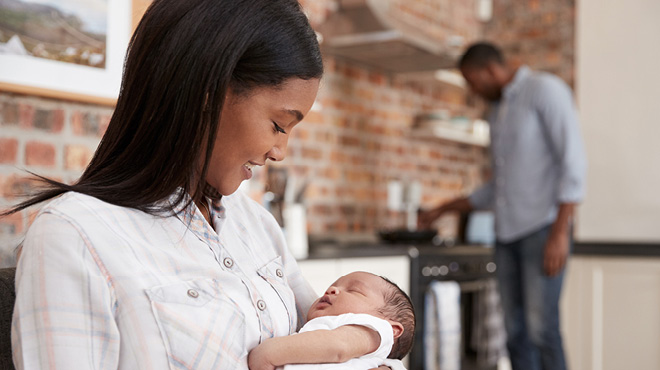Newborn Baby Care Tips for First Time Moms
Newborn baby care tips for first time moms include feeding on demand, proper hygiene, safe sleeping practices, and seeking medical attention when needed. Welcoming a new baby into the world can be exciting and overwhelming, especially for first-time moms.
Taking care of a newborn requires patience, attention, and careful consideration of their needs. Newborns need constant care and supervision, so it’s important to be prepared and well-informed. In this article, we’ll cover some essential tips for first-time moms on how to take care of their newborns.
From feeding and burping to diapering and bathing, we’ll provide helpful guidance on how to provide the best care for your little one. Let’s get started!

Credit: www.mayoclinichealthsystem.org
Importance Of Proper Newborn Baby Care
Newborn baby care is an extremely crucial aspect of parenting, especially for first-time moms. Your little bundle of joy needs proper attention and care for a healthy and happy start to life. In this blog post, we’ll discuss the importance of proper newborn baby care and the common issues new parents face.
Buy baby care product
Why Proper Newborn Care Is Essential
Proper newborn care is critical for your baby’s growth and development during the first few weeks of life.
- Newborn babies are delicate and require tender love and care. Proper care ensures your baby is healthy, safe, and happy.
- It can help prevent infections and illnesses, which can occur if hygiene practices, such as washing hands and sterilizing equipment, aren’t followed.
- It helps establish a strong bond between you and your baby by creating a sense of security, which is vital for their emotional and social development.
Common Issues Newborns Face
Newborns can experience various issues, but some are more common than others. It’s essential to understand these issues and how to address them.
- Jaundice: A yellowing of the skin or eyes that occurs when a baby’s liver function is still maturing.
- Diaper rash: An irritation or rash on a baby’s bottom caused by dampness or irritation from a dirty diaper.
- Feeding issues: Newborns may have trouble breastfeeding, latching on, or gaining weight.
- Baby acne: Small red or white spots that appear on a baby’s face, neck or back.
To address these common issues, it’s important to seek your doctor’s advice or consult a qualified healthcare provider for guidance.
Remember, taking care of a newborn can be overwhelming, but with the right guidance, you’ll soon get into the swing of things. By providing proper newborn care, you’ll give your bundle of joy the best start in life.
Preparing For Newborn Care
Preparing for newborn care:
Welcoming a newborn into your life can be an exciting time for every new mom. Preparing ahead of time is essential for successful newborn care. Whether you’re a first-time mother or already have a one or two-year-old, updating your baby’s supplies and arranging your home will make a big difference in your little one’s wellbeing.
Preparing Your Home For A Newborn:
- Clear clutter: Remove unnecessary items or furniture from your baby’s room and the house. Free up space for your baby’s stuff, such as a changer table, a rocking chair, a bassinet, and so on.
- Get a baby monitor: Invest in a good quality baby monitor so you can monitor your baby’s sleep and activity from anywhere in the home.
- Temperature control: Babies cannot maintain their body temperature, so maintaining the optimal room temperature, and using a humidifier helps to keep the baby comfortable.
- Childproofing: From watching your baby learn to crawl, to walking and running, every stage of a baby’s life requires different childproofing techniques. It helps to get ahead of hazards and install safety locks on cabinets and drawers so your little ones cannot access anything hazardous.
Essential Supplies For Newborn Baby Care:
Preparing for newborn care requires a range of essential supplies.
- Diapers: Newborns require over eight diapers every day, so bulk-buying a few packs of diapers before your baby arrives is essential.
- Clothes: Opt for soft, skin-friendly fabrics when buying baby clothes, such as cotton, to avoid rashes.
- Feeding supplies: Whether you choose breastfeeding or formula feeding, you’ll need a nursing pillow, breast pads, or bottles, and a sterilizer.
- Diapering supplies: Changing table, a change pad, baby wipes or washcloths, and diaper rash cream are all essentials.
- Sleeping supplies: Bassinet, and a mattress is crucial, and you can also opt for a crib, although it’s not essential for a newborn.
It’s never too early to start getting your home and newborn baby supplies in order. All of the preparations you make now will assist you in providing the perfect start for your baby’s life. Your baby’s safety and comfort must come first, so ensure that you have the necessary supplies and a safe, hazard-free environment.
Basic Newborn Care
Welcoming your newborn into your life is one of the most fulfilling and exciting moments of motherhood. However, it can also be challenging, especially if it’s your first time being a mom. Staying calm and knowing what to do will make your first days less daunting.
Below are some basic newborn care tips every first-time mom should know.
Feeding And Nutrition
Feeding your newborn is crucial for their physical and emotional development.
- Breastfeeding is the most recommended option for your child’s nutrition.
- Your baby should eat eight to twelve times a day, mostly every two to three hours.
- Ensure your baby’s mouth is correctly positioned to prevent nipple soreness.
- If you choose formula, follow the directions on the package on how to prepare it.
Bathing And Hygiene
Proper hygiene habits are essential in maintaining your baby’s health.
- Sponge bath your newborn using a clean washcloth and warm water for the first few weeks to avoid infection.
- Use a mild soap when you start bathing your baby in a baby tub.
- Do not wash your baby’s umbilical cord stump until it has completely fallen off.
- Keep your baby’s diapers changed frequently to avoid rashes and infections.
As a parent, you want to provide the best care possible for your newborn. Following these basic newborn care tips will help you in your journey of motherhood. Remember to always consult your pediatrician if you have any concerns about your newborn’s health.
Common Newborn Problems And How To Deal With Them
Having a newborn baby is a beautiful experience that can be both joyful and challenging for first-time moms. Many new moms can feel overwhelmed, especially with common newborn problems. In this section, we’ll cover some of the most common newborn issues and how to deal with them.
Colic And Crying
Colic and crying are commonly experienced by newborns.
- Crying is a baby’s way of conveying their needs. Start by checking your baby’s diaper, feeding them, or changing their position. If none of these solutions work, try comforting them through swaddling, carrying, or using a pacifier.
- Colic is characterized by excessive crying in an otherwise healthy baby for at least 3 hours, 3 days a week, and lasting for at least 3 weeks. If you suspect colic, talk to your pediatrician, who may recommend burping techniques, using gentle movement such as rocking or swaying, or other calming remedies.
Sleep Issues
Newborn babies tend to have irregular sleep patterns, which can be challenging for new moms.
- Create a bedtime routine for your newborn to help them distinguish day from night. Bathing them, reading them a book, or singing a lullaby are effective ways to get them into relaxation mode.
- Keep your baby’s sleep environment calm and relaxing by using soothing music or white noise.
- Place your baby on their back to sleep to prevent sudden infant death syndrome (sids)
- Avoid waking your baby for feeding during the night; instead, let them sleep until they wake up on their own.
While common newborn problems can be challenging to manage, these tips can significantly help first-time moms deal with them. Remember, always talk to your child’s pediatrician if problems persist.
Staying Healthy And Safe With Your Newborn
Your newborn baby requires extra care during the first few weeks after birth to ensure they remain healthy and safe. As a first-time mom, this can be overwhelming, but don’t worry; we have compiled a list of newborn baby care tips for you.
In this section, we will discuss staying healthy and safe with your newborn.
Newborn Health Care And Checkups
Newborns are sensitive and require special attention and medical care to monitor their health.
- Schedule your baby’s first pediatrician appointment within the first few weeks after delivery.
- Ensure that your baby receives all necessary pediatrician checkups and vaccinations on time.
- Monitor your baby’s feeding and diaper habits to detect any potential health issues early on.
- Pay attention to your baby’s skin appearance and contact your pediatrician if you notice any rashes, spots, or discoloration.
- Keep your baby’s environment clean and avoid exposing them to illnesses by ensuring that visitors wash their hands before handling the baby.
Safety Tips For Newborns
Newborns cannot protect themselves, so it is your responsibility to keep them safe.
- Always place your baby to sleep on their back in a crib with a firm mattress and a tightly fitted sheet.
- Keep the crib free of soft pillows, blankets, or toys that could suffocate your baby.
- Never leave your baby unattended on a high surface such as a changing table, bed, or sofa.
- Secure your baby in a car seat at all times while driving, ensuring that it is properly installed and meets safety regulations.
- Never shake your baby, which can cause brain injury or even death.
By following these tips, you can ensure that your newborn stays healthy and safe during their first few weeks of life. Remember to always consult your pediatrician if you have any concerns about your baby’s health or safety.
Frequently Asked Questions On Newborn Baby Care Tips For First Time Moms
How Often Should A Newborn Be Fed?
A newborn should be fed every 2-3 hours as they have a small stomach and need to be fed frequently.
How Do I Know If My Baby Is Getting Enough Milk?
You can tell if your baby is getting enough milk by monitoring their weight gain, diaper output, and behavior.
How Should I Bathe My Newborn?
Bathing a newborn involves using a sponge bath for the first week and then carefully holding them in a baby bathtub.
When Should I Start Tummy Time With My Newborn?
Tummy time should start as soon as you are home from the hospital to help your baby develop strong neck and shoulder muscles.
How Can I Soothe My Fussy Newborn?
You can soothe your fussy newborn by using a variety of techniques such as swaddling, rocking, and white noise.
Conclusion
As you embark on your journey of motherhood, taking care of your newborn baby will be your topmost priority. Remember, it’s okay to ask for help and take breaks when you need to. Be gentle with yourself, as well as with your little one.
Prepare ahead of time, stock up on baby essentials, and create a nurturing environment for you and your family. Learn the basics of baby care, from feeding to bathing, and be observant of your baby’s cues and needs. Keep the bond between you and your baby strong through skin-to-skin contact, reading, and talking.
Lastly, trust your instincts and seek professional help when needed. Implementing these newborn baby care tips for first-time moms will provide the foundation for a healthy and happy life for you and your little one. Congratulations on this new chapter of your life!







One thought on “Newborn Baby Care Tips for First Time Moms”
Comments are closed.